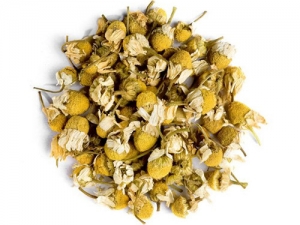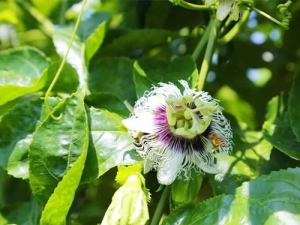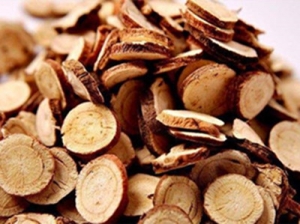Have trouble falling asleep or sleeping poorly? You’re not alone. A study by the World Health Organization found that about a third of adults suffer from at least mild insomnia. Insomnia can have many causes, including anxiety, medications, stress, chronic pain or unknown causes. There are many things you can do to improve your sleep, such as exercising, watching a movie, or, trying some herbal teas before bed. You may have heard about herbal teas for sleep and wondered which one to use. Fortunately, there are several choices. These include Valerian root, Chamomile, Passionflower, Lemon balm, and Passionflower. Bedtime tea is usually a mixture of these herbs and other herbs to change the flavor and may include: mint, rose, lemon or magnolia peel. Before you choose any tea, make sure to learn about its uses and benefits, read on to discover the best herbal tea for sleep.
Chamomile

Dry Chamomile
If you’re looking for a natural remedy for insomnia, we recommend Chamomile tea. The benefits of drinking chamomile herb tea for the skin antioxidant and anti-inflammatory are widely known, but scientific studies of sleeping are lacking and proven now. Studies have proven it helps you relax and sleep. Chamomile’s sedative effect comes in small part from the flavonoid apigenin, which binds to benzodiazepine receptors in the brain and helps promote sleep. There may be other compounds in chamomile that also bind to benzodiazepines in the brain.
A 2016 study of patients with postpartum depression concluded that chamomile tea may be recommended as an adjunct to depression and sleep problems. However, the women who drank chamomile tea saw an improvement in symptoms only in the first few weeks of the study, suggesting that any effect of chamomile was short-lived. For now, there’s no proof to suggest that chamomile herb tea really works. However, the herb is known to promote tranquility, which is essential to a restful sleep.
When preparing chamomile herb tea for sleep, use hot but not boiling water to steep the leaves. Leave the leaves in the mug for at least five minutes to extract their maximum benefits. After brewing, add a little sweetener to your chamomile tea and drink it before bed. Chamomile tea can be served with milk, honey, or other ingredients, such as a lemon balm or cherry juice.
Valerian root

Valerian root
One of the benefits of Valerian root is that it helps people sleep. It can reduce the frequency and severity of hot flashes, which is particularly helpful for women suffering from menopause. Additionally, it can reduce emotional and behavioral issues that can be associated with PMS. People who are suffering from insomnia may also benefit from this tea. This herb has been found to reduce symptoms of restless leg syndrome, which is a common condition whereby a person experiences an urge to move their legs while they sleep.
The American Family Physician journal suggests that the risk of drug interactions with valerian is low. Nonetheless, it’s still advisable to consult a healthcare professional before using valerian in your daily routine. Moreover, most research on valerian has been conducted on tablets and capsules, not the tea. The reason for this is that the concentration of valerian in tea is likely to be lower than in pills or supplements. In addition, manufacturers often mix other herbs with valerian to reduce the risk of adverse reactions.
Licorice
Licorice and licorice root are ancient herbs used to treat various diseases. There is some evidence that licorice has a positive effect on sleep. A 2012 study claimed licorice (also known as Glcyrrhiza Glabra) has antidepressant and anti-anxiety properties. This study found that licorice extract increased non-rapid eye movement and induced sleep in mice. More studies are needed in humans to see if it has the same effect. Before taking any supplements or herbal teas, it is best to consult your doctor and confirm that they may interfere with other medications or health conditions.
Passionflower

Passionflowers
One of the best herbal remedies for sleep is passionflower. Passionflower is a plant with several species, including the genus Passiflora. It grows in dry, shaded areas, and is often associated with Christ. The name comes from its association with crucifixion, which was first attributed to its five petals, sepals, and stamen. It is not clear what triggered the association with Christ, but it certainly does have other uses. It is a common ingredient in herbal teas and can help you get a better night’s sleep. Passionflower has many beneficial effects on the body. In studies, passionflower increased slow-wave sleep and reduced rapid eye movement sleep. In addition to helping people sleep, passionflower has been shown to reduce anxiety and headaches, and even improve the time between seizures. It is a powerful sleep-inducing plant that many people swear by, and it’s easy to see why.
Lemon Balm

Lemon Balm plant
Drinking lemon balm herb tea before bed can have several health benefits. In addition to supporting sleep, lemon balm is used to treat nervousness and digestive upset. Many people take lemon balm as a supplement or add it to salads. Lemon balm should be consumed about an hour before bedtime. You can also add dried lemon balm to food to create a delicious herbal tea. For best results, drink the tea about an hour before bedtime.
Another herb that may help you sleep is lemon verbena. Both herbs stimulate serotonin production and can be drunk hot or cold. However, research on this plant is limited. Lemon verbena may be equally effective.
Lavender
Drinking a cup of herbal tea with lavender has therapeutic properties that promote restful sleep. Lavender has been used in traditional medicine for centuries. Its floral scent relaxes the body and promotes sleep. In addition, lavender reduces anxiety and prevents disturbed sleep. For these reasons, it is a popular ingredient in herbal teas. Here are three reasons to drink a cup of lavender tea before bed.
This calming effect of lavender tea can help people fall asleep faster. Drinking lavender tea in the evening can help people experience better sleep. It triggers chemical reactions in the nervous system, helping the body relax and sleep. Lavender also increases the production of dopamine and decreases the stress hormone cortisol. The drink can also increase the percentage of deep, slow-wave sleep, which is the most restorative sleep phase.
With so many bedtime teas available, you may need to experiment a bit and try different teas to find the one that works best for you. While studies have shown that each type of tea may be beneficial for improving sleep, keep in mind that a cup of tea before bed may not be the complete solution to insomnia. If you have chronic insomnia, remember to consult your doctor before taking any supplements or trying herbal teas.
“Bulk organic dry herb, contact Rainbow Biotech today! Rainbow biotech is a bulk supplier of plant extract and herb materials that serves cosmetic and drug manufacturers, animal-feeding producers, food&beverage manufacturers”
- Dandelion Extract: What It Is, Benefits, Uses and Side Effect - April 23, 2024
- Is Berberine Extract Help For Weight Loss? - April 11, 2024
- Why Is Pysllium Husk Powder A Popular Meal Replacement Ingredient? - April 3, 2024



